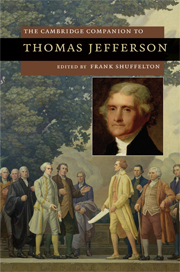Book contents
- Frontmatter
- Introduction
- 1 The Declaration of Independence and the new nation
- 2 Jefferson’s conception of republican government
- 3 Notes on the State of Virginia and the Jeffersonian West
- 4 Jefferson and Native Americans: policy and archive
- 5 Race and slavery in the era of Jefferson
- 6 Jefferson’s people: slavery at Monticello
- 7 Jefferson, science, and the Enlightenment
- 8 Thomas Jefferson and the creation of the American architectural image
- 9 The politics of pedagogy: Thomas Jefferson and the education of a democratic citizenry
- 10 Jefferson and religion: private belief, public policy
- 11 Jefferson and the language of friendship
- 12 Jefferson and Adams: friendship and the power of the letter
- 13 The resonance of minds: Thomas Jefferson and James Madison in the republic of letters
- 14 Jefferson and the democratic future
- Further reading
- Index
12 - Jefferson and Adams: friendship and the power of the letter
Published online by Cambridge University Press: 28 May 2009
- Frontmatter
- Introduction
- 1 The Declaration of Independence and the new nation
- 2 Jefferson’s conception of republican government
- 3 Notes on the State of Virginia and the Jeffersonian West
- 4 Jefferson and Native Americans: policy and archive
- 5 Race and slavery in the era of Jefferson
- 6 Jefferson’s people: slavery at Monticello
- 7 Jefferson, science, and the Enlightenment
- 8 Thomas Jefferson and the creation of the American architectural image
- 9 The politics of pedagogy: Thomas Jefferson and the education of a democratic citizenry
- 10 Jefferson and religion: private belief, public policy
- 11 Jefferson and the language of friendship
- 12 Jefferson and Adams: friendship and the power of the letter
- 13 The resonance of minds: Thomas Jefferson and James Madison in the republic of letters
- 14 Jefferson and the democratic future
- Further reading
- Index
Summary
On July 4, 1826, Americans witnessed a seemingly providential coincidence: as the nation commemorated the fiftieth anniversary of the Declaration of Independence, both John Adams and Thomas Jefferson died. Thus ended a fifty-year friendship between a cantankerous New Englander with a realist's skepticism and a conflict-averse Virginian with an optimist's selective vision. The two men first encountered each other in the summer of 1775 as the American Revolution took shape and form. Forged amidst the hardships and risks of war, their friendship was strong, though at times it faced challenges; the bitter partisanship of the 1790s strained it to the breaking point. But in the end, it survived, grounded on each man's fundamental appreciation of the other man's character, and, once the turmoil of public life was behind them, it flourished again. They lived long enough to rekindle their friendship through a rich correspondence, two elder statesmen musing on their lives, their experiences, and the heady events of their times in a written conversation that continued for over a decade. Between 1812 and 1826 Adams and Jefferson exchanged over 150 letters bearing remarkable testimony to their hearts and minds as they reflected on the past, present, and future. Not surprisingly, they often touched on political topics, debating their political differences and ideals, and thinking back on shared allies and enemies and the legacies of their victories and defeats. But their range reached much wider, encompassing topics as diverse as political philosophy, religion, linguistics, and the natural sciences. Their letters have the tone and feel of an ongoing dialogue, the loquacious Adams writing almost twice as many letters as the more reticent Jefferson, but both men clearly reveling in the exchange.
- Type
- Chapter
- Information
- The Cambridge Companion to Thomas Jefferson , pp. 168 - 178Publisher: Cambridge University PressPrint publication year: 2009



